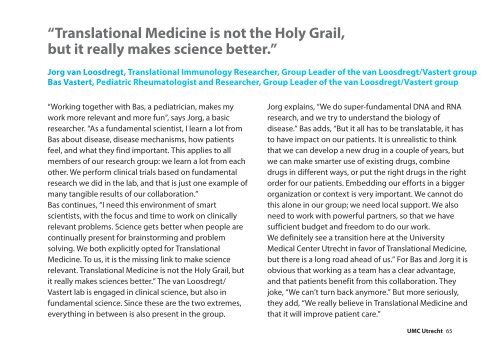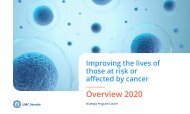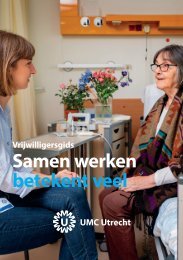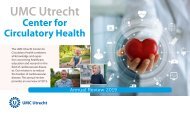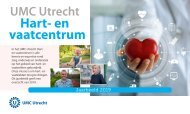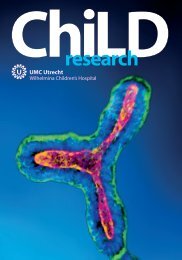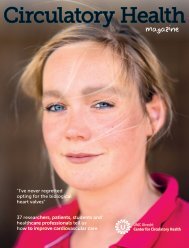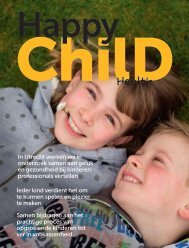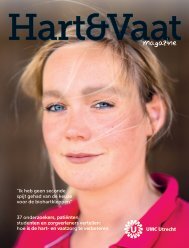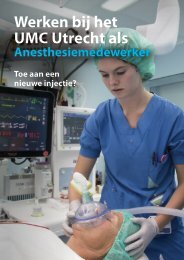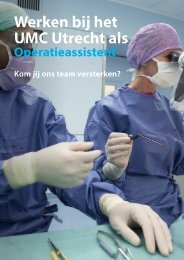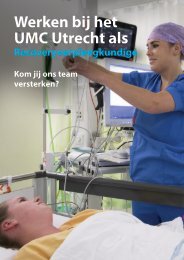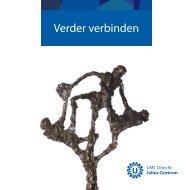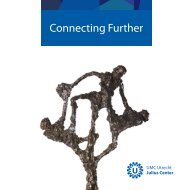RVB Translational Medicine Book
You also want an ePaper? Increase the reach of your titles
YUMPU automatically turns print PDFs into web optimized ePapers that Google loves.
“<strong>Translational</strong> <strong>Medicine</strong> is not the Holy Grail,<br />
but it really makes science better.”<br />
Jorg van Loosdregt, <strong>Translational</strong> Immunology Researcher, Group Leader of the van Loosdregt/Vastert group<br />
Bas Vastert, Pediatric Rheumatologist and Researcher, Group Leader of the van Loosdregt/Vastert group<br />
“Working together with Bas, a pediatrician, makes my<br />
work more relevant and more fun”, says Jorg, a basic<br />
researcher. “As a fundamental scientist, I learn a lot from<br />
Bas about disease, disease mechanisms, how patients<br />
feel, and what they find important. This applies to all<br />
members of our research group: we learn a lot from each<br />
other. We perform clinical trials based on fundamental<br />
research we did in the lab, and that is just one example of<br />
many tangible results of our collaboration.”<br />
Bas continues, “I need this environment of smart<br />
scientists, with the focus and time to work on clinically<br />
relevant problems. Science gets better when people are<br />
continually present for brainstorming and problem<br />
solving. We both explicitly opted for <strong>Translational</strong><br />
<strong>Medicine</strong>. To us, it is the missing link to make science<br />
relevant. <strong>Translational</strong> <strong>Medicine</strong> is not the Holy Grail, but<br />
it really makes sciences better.” The van Loosdregt/<br />
Vastert lab is engaged in clinical science, but also in<br />
fundamental science. Since these are the two extremes,<br />
everything in between is also present in the group.<br />
Jorg explains, “We do super-fundamental DNA and RNA<br />
research, and we try to understand the biology of<br />
disease.” Bas adds, “But it all has to be translatable, it has<br />
to have impact on our patients. It is unrealistic to think<br />
that we can develop a new drug in a couple of years, but<br />
we can make smarter use of existing drugs, combine<br />
drugs in different ways, or put the right drugs in the right<br />
order for our patients. Embedding our efforts in a bigger<br />
organization or context is very important. We cannot do<br />
this alone in our group; we need local support. We also<br />
need to work with powerful partners, so that we have<br />
sufficient budget and freedom to do our work.<br />
We definitely see a transition here at the University<br />
Medical Center Utrecht in favor of <strong>Translational</strong> <strong>Medicine</strong>,<br />
but there is a long road ahead of us.” For Bas and Jorg it is<br />
obvious that working as a team has a clear advantage,<br />
and that patients benefit from this collaboration. They<br />
joke, “We can’t turn back anymore.” But more seriously,<br />
they add, “We really believe in <strong>Translational</strong> <strong>Medicine</strong> and<br />
that it will improve patient care.”<br />
UMC Utrecht 65


